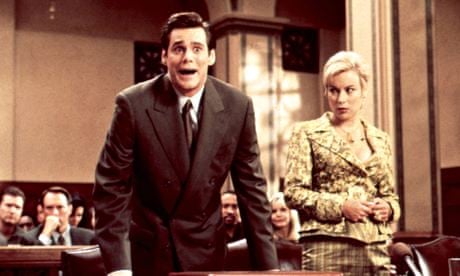Courtrooms and curses: two anchoring Hollywood notions. Audiences love a courtroom drama. And they'll buy in to a curse – any curse, from a body swap to a distasteful compulsion or an unwanted power – as long as there's an adorable kid involved in its conception or application.
I like to think that when screenwriters Paul Guay and Stephen Mazur first sketched out Liar Liar, they'd just emerged from back-to-back screenings of To Kill a Mockingbird and Big, or maybe Twelve Angry Men and Vice Versa (a film from 1988, should you be unfamiliar with it, in which Fred Savage, with the help of a magical Buddhist skull, curses Judge Reinhold to spend a week as a preteen). Guay and Mazur saw a curse and a courtroom – and this was fresh narrative ground. Eight figures, in 1995, secured Jim Carrey. Tom "Patch Adams" Shadyac would direct.
I first watched Liar Liar at the Turnpike Lane Coronet in 1997. Aged 14, I found it flawless. Of course I did. To a generation of young filmgoers, Carrey could do no wrong. Certainly not until he side-brushed his quiff and went all earnest and proper in The Truman Show. We found the good in his Riddler in Batman Forever ("Joy-gasm!"), and forgave that joke-light stinker The Cable Guy. Because this was the man who – over a giddy 18-month run – had been Stanley Ipkiss, Lloyd Christmas, Ace Ventura.
Now Liar Liar pitched us Carrey as Fletcher Reede, an articulate Los Angeles lawyer with a flair for the sort of compelling mendacity that won the wrong people their court cases. Fletcher is also a careless father, prone to fibbing his way out of playdates with his young son, Max.
After chucking Max's fifth birthday party in order to sleep with a female colleague, Fletcher gets his curse. Max (adorable) makes a wish: an extremely specific wish; the Hollywood ideal of a wish, in that it comes with a built-in plot structure. "I wish, for just one day, Dad couldn't tell a lie," says Max (very possibly there was an earlier draft in which Max cosmic-ordered his curse "for just two acts").
In a flash, Reede, professionally compelled and personally disposed to bullshit, is compelled to tell the truth for 24 hours. "I've had better," he tells his female colleague after their tryst. "I failed to yield at a crosswalk," he admits to a traffic cop, volunteering a fistful of unpaid parking tickets. To a homeless guy who wanted to know why he wouldn't spare a dollar: "Because I believe you will buy booze with it." To his boss: "Asshole!" To himself: "I'm a bad father."
Fletcher, inevitably, learned how to be a good father as he worked through the curse's incubation period. I'm sure, sitting in the Coronet, I found this satisfying enough, a tender final counterpoint to the movie's main business of horseplay (Fletcher's mental block is used, aggressively, as an excuse for Carrey to smash office equipment, fall over, leap into walls and crush his own head with a toilet seat). Watching and rewatching Liar Liar in the years since, though, I've come to see it was a far more interesting film than Carrey's other early-career knockabouts. It was more honest.
Max, who wanted a lie-free life, at least for one day, put Fletcher in a position where he could no longer exist in society without causing pain. Certainly whenever he appeared in court, Fletcher's handicap proved benign and very funny ("Your honour I object." "Why's that?" "Because it's devastating my case." "Overruled." "Good call!"). But Fletcher was also compelled to move through his workplace, a room full of innocents, telling each of them something awful about themselves. The fat were informed they were fat, the smelly that they were smelly. Stripped of the ability to tell any manner of lie, low-level, social, white, he became a more harmful presence than he ever was as a bluffing smoothy.
Fletcher tries to explain this to Max in the midst of his curse, offering up the film's essential, adult lesson: "Everybody lies."









Comments (…)
Sign in or create your Guardian account to join the discussion